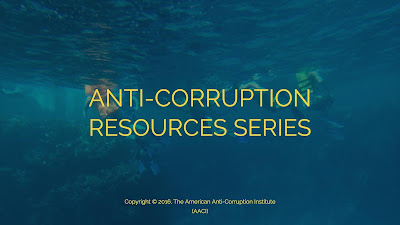December 30, 2016
What is the
resilience of an entity in preventing, deterring, and detecting fraud and
corruption?
Part 1(C) Fraud and
Corruption Deterrence in a For-Profit
Organization
Corruption is an
illegal and immoral act of serious existential consequences on organizations.
Whatever the cost of fraud and corruption deterrence mechanisms organizations
use, it would be less costly than what they would suffer from the ramifications
of uncovered and publicized case(s) of fraud and corruption. Fraud and
corruption deterrence aims to:
1. Set the proper tone at the top
2. Increase the likelihood of detecting corrupt acts
3. Heighten perpetrator's costs
Read more when you log in. CACM members
can access this series when they log in to the membership portal or click here.
We will start rolling over the CACM via
exam in selected countries and regions. CACM candidates of these countries will
find the CACM Review material helpful.







